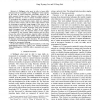Free Online Productivity Tools
i2Speak
i2Symbol
i2OCR
iTex2Img
iWeb2Print
iWeb2Shot
i2Type
iPdf2Split
iPdf2Merge
i2Bopomofo
i2Arabic
i2Style
i2Image
i2PDF
iLatex2Rtf
Sci2ools
ICRA
2009
IEEE
2009
IEEE
Bayesian network-based behavior control for skilligent robots
A Skilligent robot must be able to learn skills autonomously to accomplish a task. "Skilligence" is the capacity of the robot to control behaviors reasonably, based on the skills acquired during run-time. Behavior control based on Bayesian networks is used to control reasonable behaviors. To accomplish this, subgoals are first discovered by clustering similar features of state transition tuples, which are composed of current states, actions, and next states. Here, features used in clustering are produced using changes of the states in the state transition tuples. Parameters of Bayesian networks and utility functions are learned separately using state transition tuples belonging to each subgoal. To select the best action while executing a task, the expected utility of each subgoal is calculated by the expected utility function and the robot chooses the action that maximizes expected utility calculated by the maximum expected utility (MEU) function. The MEU function is based on...
| Added | 19 Feb 2011 |
| Updated | 19 Feb 2011 |
| Type | Journal |
| Year | 2009 |
| Where | ICRA |
| Authors | Sang Hyoung Lee, Il Hong Suh |
Comments (0)

